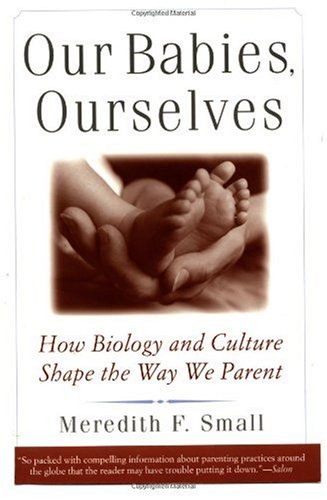Shortening a Baby's Crying Duration
What seems to work best is simple human contact. Peter Wolff long ago demonstrated that picking up a baby works better than anything else to stop any baby from crying. In another study, infant researchers BeU and Ainsworth showed in the 1970s, with a sample of twenty-six infants, that consistent and prompt response by the infant's mother is associated with a decrease in the duration of infant crying. Urs Hunziker and Ronald Barr recently took this idea even further when they experimented with different infant carrying schedules to test whether or not carrying could have a proactive effect on crying. They recruited a group of parents with newborns and asked half of them to carry their infants at least three hours per day beyond feeding time. The other subjects were not told to carry their infants any more than they normally would. When the babies were twelve weeks of age, the mothers were asked to bring in diaries in which they had noted when and how long their babies cried, The researchers found that the control mothers carried their babies on average 2.7 hours a day and the mothers involved in the experiment carried their babies about 4.4 hours per day, an increase of only 1.7 hours per day. The diaries show that during the peak crying period at eight weeks of age, both groups of babies cried with the same frequency, but those that had been carried longer cried 43 percent less in duration than those carried a shorter time per day; the frequency of crying was the same but the duration was almost half as much. The infants who were carried more also reached their crying peak on the early side, at four weeks, and leveled off at six weeks. Interestingly, when this same procedure was later tried on babies already labeled as "colicky," it didn't work as well. Even though half of the 66 colicky four-week-olds were carried 56 percent more (2.2 hours longer) than the other colicky babies, they didn't cry less. Perhaps longer carrying would have been effective if it had been done from birth, but either one month of age is perhaps too late for differences in parental style to have much effect on crying or these babies labeled as colicky were just not as susceptible to being comforted in this manner.
Although type of food and total amount of food do not seem to dramatically affect infant crying, the timing of food and the way food is delivered do seem to be of prime importance in staving off crying. Comparing members of the La Leche League, women devoted to relatively continuous breast-feeding, and a group of mothers following die more traditional American pattern of feeding on a schedule with hours between feedings, Barr and his colleagues explored the possibility that the length of time between feedings might have an effect on crying. Observing these two groups at home, and through daily diaries kept by mothers, Barr and Elias found that the quietest infants were those who were fed at short intervals and whose mothers quickly responded to their crying. Interestingly it was the combination of feeding and response, and not just food, that was so effective; the infants of mothers who fed in short intervals but were slow to respond, and of those who fed with long intervals between feedings but responded quickly, all cried a lot. In other words, it's not just the constant availability of milk that makes a baby happy, it is also an engaged mother who responds quickly.
Pediatricians and child experts suggest trying one soothing technique after another. But the best answer, according to this research, is a particular parenting style. What crying babies seem to need most, or what decreases their crying, is a caretaking package that puts their world right. And some babies seem to yell louder than others for a change if their world is not in balance.
Notes:
Nothing works better than carrying the baby and responding quickly to its needs.
Folksonomies: infancy attachment parenting crying
Taxonomies:
/family and parenting/babies and toddlers (0.694730)
/science/medicine/pediatrics (0.278295)
/family and parenting (0.252312)
Keywords:
peak crying period (0.904175 (negative:-0.392248)), babies (0.850945 (negative:-0.511115)), infant crying (0.779033 (negative:-0.271504)), crying peak (0.713503 (negative:-0.446516)), infant researchers BeU (0.669759 (neutral:0.000000)), infants (0.632681 (negative:-0.485327)), short intervals (0.632074 (negative:-0.447532)), colicky babies (0.608592 (negative:-0.402866)), La Leche League (0.602857 (neutral:0.000000)), relatively continuous breast-feeding (0.599487 (negative:-0.337755)), traditional American pattern (0.586411 (negative:-0.311554)), particular parenting style (0.579805 (positive:0.414648)), mothers (0.571316 (negative:-0.394531)), colicky four-week-olds (0.503363 (negative:-0.411549)), control mothers (0.495166 (negative:-0.320424)), different infant (0.469042 (negative:-0.313028)), Peter Wolff (0.461239 (negative:-0.371709)), quietest infants (0.457190 (negative:-0.491443)), Urs Hunziker (0.455116 (negative:-0.313028)), baby (0.449770 (negative:-0.179133)), Ronald Barr (0.448401 (negative:-0.313028)), prompt response (0.434972 (negative:-0.271504)), proactive effect (0.433609 (negative:-0.313028)), shorter time (0.419054 (negative:-0.594012)), long intervals (0.414278 (negative:-0.328863)), parental style (0.413816 (negative:-0.693213)), soothing technique (0.413415 (positive:0.273568)), daily diaries (0.411505 (neutral:0.000000)), prime importance (0.407845 (negative:-0.746048)), child experts (0.407307 (positive:0.273568))
Entities:
Ronald Barr:Person (0.816464 (negative:-0.462640)), Peter Wolff:Person (0.583990 (negative:-0.371709)), La Leche League:Organization (0.536248 (neutral:0.000000)), Urs Hunziker:Person (0.510534 (negative:-0.313028)), Ainsworth:Person (0.498201 (neutral:0.000000)), Elias:Person (0.385864 (negative:-0.491443)), twelve weeks:Quantity (0.385864 (neutral:0.000000)), eight weeks:Quantity (0.385864 (neutral:0.000000)), three hours:Quantity (0.385864 (neutral:0.000000)), 43 percent:Quantity (0.385864 (neutral:0.000000)), 56 percent:Quantity (0.385864 (neutral:0.000000)), four weeks:Quantity (0.385864 (neutral:0.000000)), 1.7 hours:Quantity (0.385864 (neutral:0.000000)), 2.2 hours:Quantity (0.385864 (neutral:0.000000)), 2.7 hours:Quantity (0.385864 (neutral:0.000000)), 4.4 hours:Quantity (0.385864 (neutral:0.000000)), four-week:Quantity (0.385864 (neutral:0.000000)), one month:Quantity (0.385864 (neutral:0.000000)), six weeks:Quantity (0.385864 (neutral:0.000000))
Concepts:
Infant (0.963743): dbpedia | freebase | opencyc
Breastfeeding (0.930514): dbpedia | freebase | yago
Baby colic (0.851081): dbpedia | freebase | yago
Pediatrics (0.721381): dbpedia | freebase | opencyc
Childbirth (0.650733): dbpedia | freebase
Pacifier (0.614828): dbpedia | freebase | opencyc
Pregnancy (0.607067): dbpedia | freebase | opencyc
Infancy (0.600282): dbpedia






